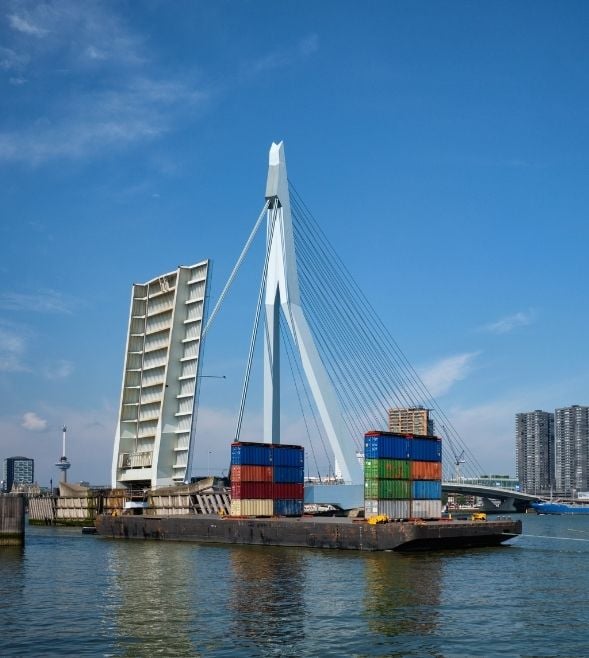-
Financial administration & outsourcing
Entrepreneurs who outsource financial administration reduce the number of administrative tasks and consequently have more time and space to focus on growth.
-
Financial insight
We help you turn financial data into valuable insights that support you in making well-founded decisions. In-depth analyses of your financial situation will help give you a better idea of where you stand and where the opportunities for growth lie, both in the short and long term.
-
Financial compliance
We make sure your company complies with financial legislation and regulations, with correct financial statements, tax reports and other obligations. From our global network, we support you in managing local and international tax risks.

-
Impact House by Grant Thornton
Building sustainability and social impact. That sounds good. But how do you go about it in the complex world of stakeholders, regulations and frameworks and changing demands from clients and society? How do you deal with important issues such as climate change and biodiversity loss?
-
Business risk services
Minimize risk, maximize predictability, and execution Good insights help you look further ahead and adapt faster. Whether you require outsourced or co-procured internal audit services and expertise to address a specific technology, cyber or regulatory challenge, we provide a turnkey and reliable solution.
-
Cyber risk services
What should I be doing first if my data has been kidnapped? Have I taken the right precautions for protecting my data or am I putting too much effort into just one of the risks? And how do I quickly detect intruders on my network? Good questions! We help you to answer these questions.
-
Deal advisory
What will the net proceeds be after the sale? How do I optimise the selling price of my business or the price of one of my business activities?
-
Forensic & integrity services
Do you require a fact finding investigation to help assess irregularities? Is it necessary to ascertain facts for litigation purposes?
-
Valuations
Independent and objective valuations tailored for mergers, acquisitions, and legal matters.

-
Auditing of annual accounts
You are answerable to others, such as shareholders and other stakeholders, with regard to your financial affairs. Financial information must therefore be reliable. What is more, you want to know how far you are progressing towards achieving your goals and what risks may apply.
-
IFRS services
Financial reporting in accordance with IFRS is a complex matter. Nowadays, an increasing number of international companies are becoming aware of the rules. But how do you apply them in practice?
-
ISAE & SOC Reporting
Our ISAE & SOC Reporting services provide independent and objective reports on the design, implementation and operational effectiveness of controls at service organizations.

-
International corporate tax
The Netherlands’ tax regime is highly dynamic. Rules and the administrative courts raise new challenges in fiscal considerations on a nearly daily basis, both nationally and internationally.
-
VAT advice
VAT is an exceptionally thorny issue, especially in major national and international activities. Filing cross-border returns, registering or making payments requires specialised knowledge. It is crucial to keep that knowledge up-to-date in order to respond to the dynamics of national and international legislation and regulation.
-
Customs
Importing/exporting goods to or from the European Union involves navigating complicated customs formalities. Failure to comply with these requirements usually results in delays. In addition, an excessively high rate of taxation or customs valuation for imports can cost you money.
-
Human Capital Services
Do your employees determine the success and growth of your organisation? And are you in need of specialists which you can ask your Human Resources (HR) related questions? Human Resources (HR) related questions? Our HR specialists will assist you in the areas of personnel and payroll administration, labour law and taxation relating to your personnel. We provide you with high-quality personnel and payroll administration, good HR guidance and the right (international) advice as standard. All this, of course, with a focus on the human dimension.
-
Innovation & grants
Anyone who runs their own business sets themselves apart from the rest. Anyone who dares stick their neck out distinguishes themselves even more. That can be rather lucrative.
-
Tax technology
Driven by tax technology, we help you with your (most important) tax risks. Identify and manage your risks and become in control!
-
Transfer pricing
The increased attention for transfer pricing places greater demands on the internal organisation and on reporting.
-
Sustainable tax
In this rapidly changing world, it is increasingly important to consider environmental impact (in accordance with ESG), instead of limiting considerations to financial incentives. Multinational companies should review and potentially reconsider their tax strategy due to the constantly evolving social standards
-
Pillar Two
On 1 January 2024 the European Union will introduce a new tax law named “Pillar Two”. These new regulations will be applicable to groups with a turnover of more than EUR 750 million.
-
Cryptocurrency and digital assets
In the past decade, the utilization of blockchain and its adoption of a distributed ledger have proven their capacity to revolutionize the financial sector, inspiring numerous initiatives from businesses and entrepreneurs.
-
Streamlined Global Compliance
Large corporations with a presence in multiple jurisdictions face a number of compliance challenges. Not least of these are the varied and complex reporting and compliance requirements imposed by different countries. To overcome these challenges, Grant Thornton provides a solution to streamline the global compliance process by centralizing the delivery approach.
-
Corporate Law
From the general terms and conditions to the legal strategy, these matters need to be watertight. This provides assurance, and therefore peace of mind and room for growth. We will be pro-active and pragmatic in thinking along with you. We always like to look ahead and go the extra mile.
-
Employment Law
What obligations do you have with an employee on sick leave? How do you go about a reorganisation? As an entrepreneur, you want clear answers and practical solutions to your employment law questions. At Grant Thornton, we are there for you with clear advice, from contracts and terms of employment to complex matters such as dismissal or reorganisation.
-
Sustainable legal
At Grant Thornton, we help companies integrate sustainability into their business operations, with sustainable legal at the heart of our approach. We advise on ESG (Environmental, Social, Governance) legislation, and help draft sustainable contracts, implement HR policies, and carry out ESG due diligence in M&A transactions (Mergers and Acquisitions).
-
Maritime sector
How can you continue to be a global leader? The Netherlands depends on innovation. It is our high-quality knowledge which leads the maritime sector to be of world class.


Background
On 5 April 2022, the EU Council adopted the Directive 2022/542 which not only provides that the Member States (MSs) can apply the reduced rates to certain live-streamed activities but also confirms that from 1 January 2025, the supply of a virtual event is taxable in the country where the consumer resides or is established.
New place of supply rules for interactive virtual events
The changes apply for interactive online events and other live-streamed activities that do not qualify as electronic services.
For example, online events that are pre-recorded qualify as electronically supplied services and are subject to VAT in the country where the consumer resides or is established under the current VAT rules.
B2B or B2C
The events made virtually available or other live-streamed activities could be provided to either private individuals (or other non-VAT-registered persons – B2C) or to businesses (B2B).
B2C
The new rule applies to activities which are streamed or otherwise made virtually available. This means that new place of supply rules do not only apply to virtual events but to all live-streamed activities.
The virtual event will be subject to VAT in the EU MS in which the recipient of the services is established, has his permanent address or usually resides.
This means that the providers of such cross-border services must charge the VAT of the MS of their customers (the threshold of €10,000 applies to EU cross-border suppliers).
Consequently, when an EU business (who has cross-border pan-European sales above the threshold of €10,000) or a non-EU businesses (no threshold applies) provides cross-border virtual events or other live-streamed activities to non-VAT registered recipients located in the EU, the supplier becomes liable to register for VAT in all EU MSs where it has customers.
OSS registration possible
Alternatively, the business could opt for online One Stop Shop (OSS). This means that businesses falling in scope of the new rules are not required to VAT register in each of the EU MS of their customers if they opt for OSS.
B2B
The new directive makes it clear that the rule applicable to in-person events does not apply to events “where the attendance is virtual”. Consequently, the main place of supply rule for B2B services (Article 44 of the EU VAT Directive) applies for virtual events.
This means that, in a cross-border situation, no VAT will be charged, and the service provider will apply the so-called reverse charge mechanism. Subsequently, the B2B recipient will self-assess the VAT. This generally is in line with the current treatment of the virtual events.
Consequences of the change
B2C
The VAT treatment of the events provided to non-VAT registered persons such as private individuals will be considerably changed since the VAT of the MS of the customer should be charged under the new rules. This means that the businesses who have such cross-border activities may face new VAT registration obligations or should register for OSS (if not already registered).
B2B
The VAT treatment largely remains the same as under current rules, however, it is made clear that the place of supply rule which provides that certain B2B events are subject to VAT in the country where it takes place, does not apply to virtual events. This increases the legal certainty for taxpayers.
Several MSs have already changed their rules
The new rules apply from 1 January 2025. However, several MSs have already made steps to change the VAT treatment of the virtual events, e.g. by implementing circulars or policy decrees that include the new rules.
A possibility to apply reduced rates to live-streamed activities
The new Directive also includes a possibility for MSs to provide for the same treatment of live-streamed activities, including events, as those which, when attended in person, are eligible for reduced rates. This includes “admission to shows, theatres, circuses, fairs, amusement parks, concerts, museums, zoos, cinemas, exhibitions and similar cultural events as well as sporting events and facilities or access to the live-streaming of those events or visits or both”.
The developments in the Netherlands
In its reply to the Dutch Association of Theatres and Concert Halls regarding the applicability of VAT reduced rate on live streaming of performances and concerts, the Dutch Ministry of Finance said that it will not introduce the new reduced VAT rate for livestreaming of concerts and cultural events through a policy decree. It promised a letter to parliament outlining their overall views on the reduced VAT rate reforms first.
Practical implications
The above changes cause significant changes for VAT treatment of online events:
- Identify virtual events and other live-streamed activities (online conferences, webinars, trainings) that could be affected by the changes.
- Review the possible consequences and need for new registrations or an OSS registration.
- Find out what the consequences will be on your VAT burden, i.e. whether changes cause a reduced VAT rate to become applicable in various MSs).
- Analyze the impact on financial systems, contracts and invoicing.










